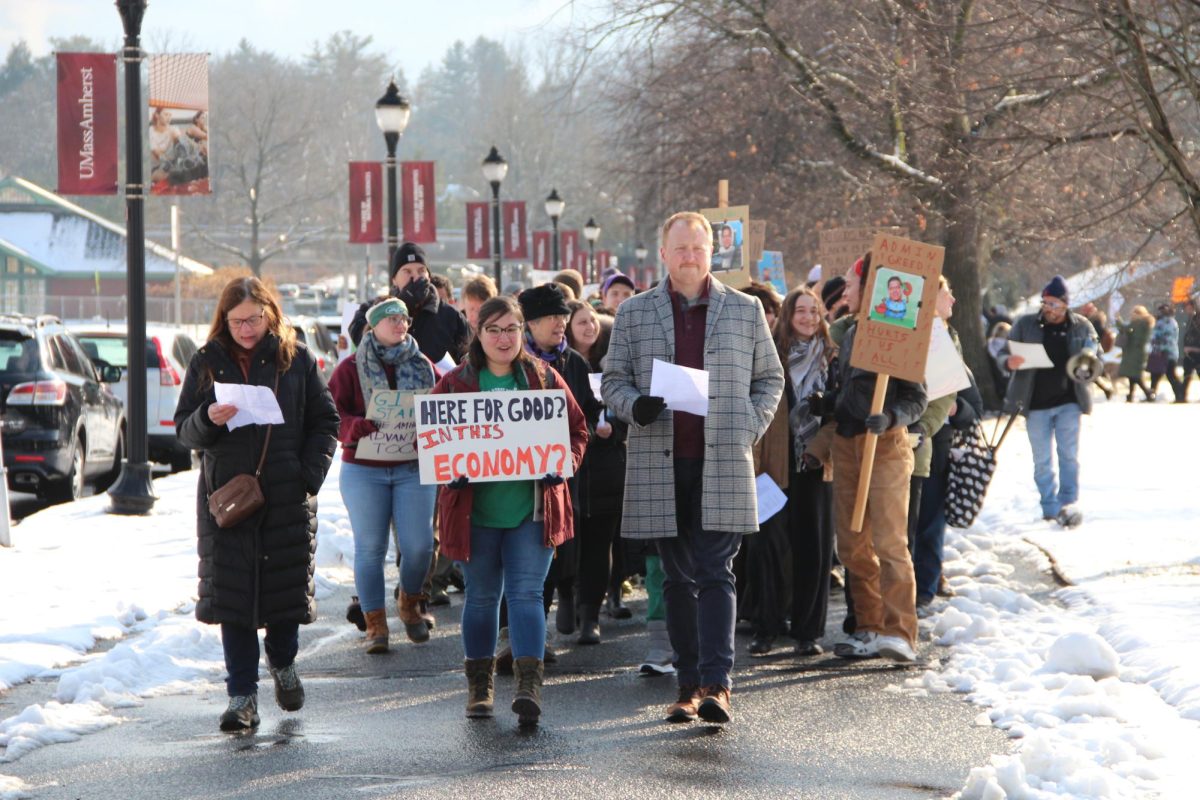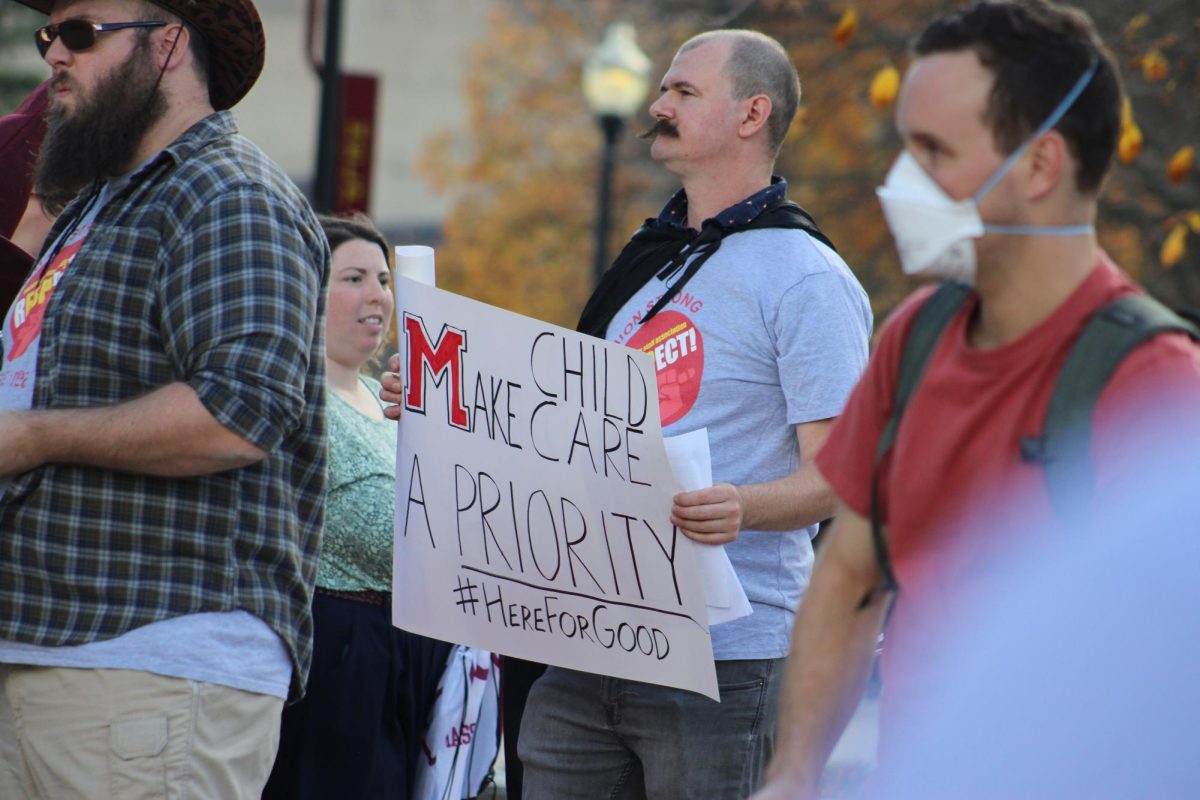As the country discusses the outcome of the 2024 general election, professors at the University of Massachusetts Amherst voiced their opinions and thoughts, all echoing a sense of concern and uncertainty.
“My emotions [around the election] were pretty, pretty mixed … I was hopeful and also concerned,” Jess Dillard-Wright, associate professor and associate dean of equity, and inclusion in the Elaine Marab College of Nursing, said.
On Wednesday, Nov. 6, former President Donald Trump became the 2024 president-elect, winning 312 electoral votes over his opponent, Vice President Kamala Harris.
“I’m not sure any of it really like, surprises me, it disappoints me immensely,” Dillard-Wright said, noting she was hopeful Harris would win.
Masoud Hashemi, an extension professor of sustainable agriculture at UMass said he was “optimistic” that Harris would win. “When I saw that all of those swing estates with no exceptions, were [leaning towards Trump] … That was very shocking to me.”
Paul Collins, professor of legal studies and political science at UMass said he “wasn’t sure who was going to win the electoral college, or I certainly wasn’t very confident one way or the other. I was fairly confident that Harris would win the popular vote, so [Trump winning both] surprised me.”
Sanjiv Gupta, a professor of sociology at UMass, was also surprised Trump won the popular vote. “It was definitely not the outcome I was rooting for.”
Professor of communication, public policy and information and computer sciences Ethan Zuckerman described the recent election as “tumultuous, uncertain and fascinating.”
The role the media played
Many professors mentioned the media they consumed before election day swayed their optimism about the election.
“The reason I surprised was, [because] I think many other people [like myself] was watching the news,” Hashemi said, “which was mainly heavily skewed toward the Democrat nominee, and because of that, you [expect to] hear good news.”
Dillard-Wright said, “My own curated social media environment was really like positive and hopeful about a Harris presidency,” making her feel more confident Harris would win.
Collins pointed out polarization in the media, specifically when it comes to politics, is something “we’re stuck in” in America and “why it’s going to be really hard to get out of it is that people are sort of consuming media that reflects their views, right, sort of like this echo chamber media and on both sides.”
Zuckerman studies the digital world, and noticed a significant shift in the way social media platforms were in the 2024 election cycle compared to 2020.
“As people are calling the ‘manosphere,’ figures like a Joe Rogan are becoming incredibly important and influential,” Zuckerman said. “Trump found a way to reach those audiences in a way that Harris really didn’t.”
Zuckerman described this as a new narrative, where people are “willing to listen to self-important men ramble for four or five hours at a time.”
“One of the scariest parts [of the 2024 election] is the emergence of old-fashioned misogyny,” Gupta said.
Dillard-Wright touched on Harris’ use of celebrities, including the Liz Cheney, a prominent Republican, to sway voters. Dillard-Wright said that tactic didn’t work for her and probably didn’t win over many moderate voters, calling it a “really, really unfortunate fumble.”
Policy worries: reproductive rights and climate initiatives
“I don’t have a lot of positive feelings about [reproductive rights]. I know that in his rhetoric, Trump has moved away from it because of how unpopular abortion bans have been widely,” Dillard-Wright said.
She added, “J.D. Vance hasn’t backed away from a total abortion ban, so I am very concerned with capital letters, right, like all caps, CONCERNED.”
“We’re seeing the implications of what happens when we have profoundly restricted abortion access,” Dillard-Wright continued. “We’re seeing young women die of complications of pregnancy that are absolutely manageable, as was the case in Texas.”
Other professors shared their anxiety over how Trump’s second presidency will impact climate change.
Hashemi studies sustainability, specifically how to have sustainable farming practices. He is concerned about how Trump will approach climate change issues “based on [Trump’s] definition of sustainability, which is totally different than mine.”
“You cannot do farming if you don’t care about the environment, and you [pollute it], whether with manure or chemicals or whatever,” Hashemi said. “Well, if you don’t believe in climate change, you don’t believe in the environment.”
Hashemi pointed to several statements Trump “wasn’t shy to say” during his campaign, including ending the mandate on electric cars.
When it comes to climate initiatives, Gupta said, “Small, small backward steps will have a large impact simply because they stop the progress,” adding, “We can’t afford even small setbacks.”
A “Walkout against Trump” was held at UMass on Nov. 8. Protestors expressed their disappointment in the election results and their fear that Trump’s second presidency will push back climate change initiatives.
The impact at UMass
Professors pointed to Trump’s stance against immigration as a key-issue that will impact students, specifically international students.
“I do know a lot of international students are nervous because … a major percentage of the international students, they plan to stay, and that could be problematic,” Hashemi said.
Similar to Hashemi, Dillard-Wright said, “We have students from around the world, and some of the things that I’m hearing about what [Trump’s] day-one plans are by executive order. I’m worried about my international students and my international colleagues.”
Trump has made several comments on his day-one plans he will perform when he enters office, including mass deportations of immigrants.
“I’m also particularly worried that people who are here legally and with documentation are going to be targeted in the same way that undocumented people are targeted and that it’s going to be incredibly harmful for lots and lots of vulnerable people,” Zuckerman said.
Zuckerman added, “I am really, really worried about what’s going to happen to individuals, friends, as well as immigrants as a whole. I’m really worried for queer people,” continuing to describe how Trump and his allies have specifically targeted trans individuals and women.
Dillard-Wright said, “There’s lots of things that are going to impact us as an institution,” continuing that the rhetoric used in the Trump administration has made her believe some research will not be funded.
“I think we can anticipate things like cutting funding for things like the National Endowment for the Humanities and the National Endowment for the Arts, and you know the humanities and the arts are fundamental to building a world that is just, equitable, joyful and beautiful,” Dillard-Wright said.
Despite the election’s outcome not aligning with his views, Gupta feels fortunate to be at a place like UMass, where students and faculty are “capable of mounting a strong response to world events.”
UMass students previously expressed dissatisfaction with Trump’s win over former Secretary of State Hillary Clinton in the 2016 Presidential election.
“Given what I know about the students at UMass, I think we’re going to see mobilization,” Hupta said. “Kind of like what we saw the last time Trump was elected president. I’ve had the opportunity to have some conversations this morning with some of my students, and they were asking things like that, like, what can I do now?”
Looking forward
Collins reflected on Trump’s first time in office, saying, “You weren’t quite sure what you were going to get on any given day.” He added, “We’re not sure what he’s going to focus on, or what’s going to be the signature policy efforts [of his second presidency].”
Collins studied Trump’s behavior and policy for years and pointed out, “A lot of the things that [Trump] says won’t come to fruition one way or the other and there’s also a lot of things he didn’t say that may come to fruition.”
Collins, Dillard-Wright and Gupta echoed similar sentiments that now is a time of reflection and action.
“I know what the student body is like here, and I know that most folks probably aren’t very happy with the outcome of the election,” Collins said. “You know, in the short term, I think it’s useful to stay busy and do things that you like. In the long term, if, if people want to be politically active, there’s lots of opportunities to do that.”
Collins also emphasized that for students and community members who want to see change occur, it’s important to focus on the state and local levels at this time.
“We need to not imagine that we’re invulnerable because [we live in Massachusetts], and thats we’re also part of this larger nation, and if we have federal legislation that goes through, I don’t really know what we can expect,” Dillard-Wright said.
“Focus on issues that aren’t on everybody’s minds as often, things like court reform, gerrymandering reform, things of this nature,” Collins said. “They might not be the sort of sexiest topics, but they’re still incredibly important.”
While some professors suggest political activism others suggest taking your mind off the election, even for just a while.
Hashemi said he has “decided not to watch any more news for four years,” hoping to ignore Trump and his policy. Collins suggested that cleaning your house is a great way to keep your mind off the negative aspects. “My bathroom is very clean right now,” Collins joked.
“Don’t lose hope,” Dillard-Wright repeated. “Hope is a practice. It’s not a feeling. So find ways to make joy and build community, because in those things are hope… We’ve got us, that may be all we’ve got, but it’s something.”
Alexandra Hill can be reached at [email protected] and Daniella Pikman can be reached at [email protected]




















